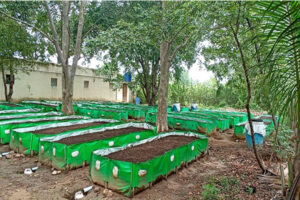AVA Farms
AVA Farms, operated by the Gramonnati Trust, is a leading example of sustainable agriculture. Spanning 38.99 acres, the farm incorporates various facilities such as poly houses, greenhouses, open farms, vermicompost units, and grow bag plantations. It has revolutionized sustainable farming through its focus on soil health, innovative practices, and waste reduction initiatives.
During the implementation of the vermicompost project, AVA Farms faced challenges related to farmyard manure (FYM) quality, transportation, and collection. However, through strict quality control measures and collaborations with trusted suppliers, they ensured a consistent supply of high-quality FYM for compost production. Partnerships with local transport providers and optimised route planning addressed logistical difficulties and reduced costs in transportation. Standardised collection processes streamlined the integration of FYM into the vermicomposting system. To address nutrient leaching caused by rainfall, AVA Farms developed drainage systems, minimise nutrient loss. They also encountered weed growth issues due to external sources of FYM. However, the application of vermicompost helped reduce weed growth, highlighting its effectiveness as a weed control measure.
AVA Farms’ vermicomposting operations yielded significant outcomes. With an installed capacity of 32 bags, the capital expenditure cost amounted to 2.5 lakh rupees. Each harvest produced approximately 25.6 tonnes of vermicompost. This not only improved soil health but also served as a valuable by-product. Vermi wash, a by-product of the vermicomposting process, acted as a growth promoter and pest controller, enhancing the overall productivity and health of the farm. The successful implementation of sustainable practices at AVA Farms led to improved soil health, increased crop yields, waste reduction, and market growth. These positive outcomes validate the importance of sustainable agriculture in achieving environmental and economic sustainability. AVA Farms’ journey also yielded valuable lessons, including the significance of strict quality control, efficient transportation and collection, and effective management of nutrient leaching. In the future, AVA Farms plans to expand its operations and enhance sustainability initiatives further. This includes increasing the adoption of solar energy for dehydration and exploring innovative technologies for waste management and resource utilization. AVA Farms serves as an inspiration for other farms and organizations seeking to adopt sustainable agriculture practices.
